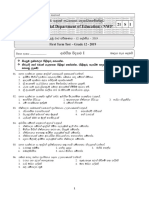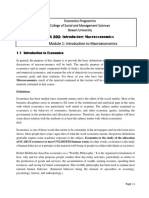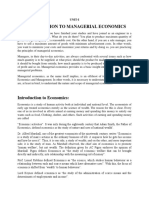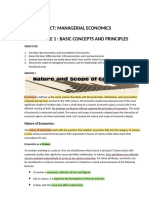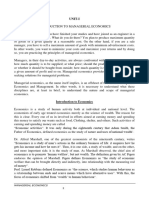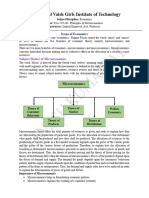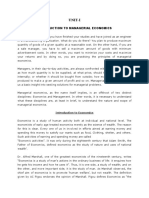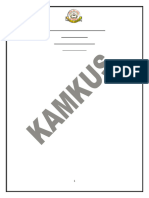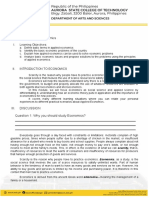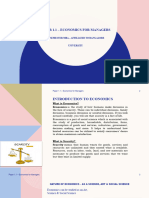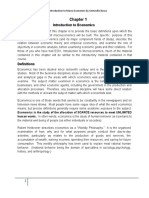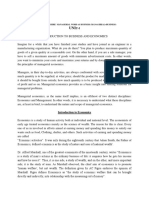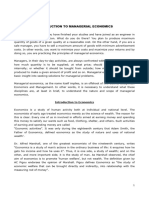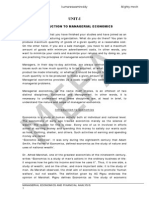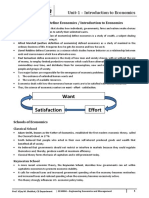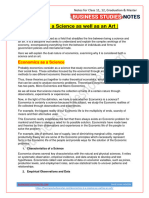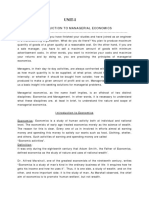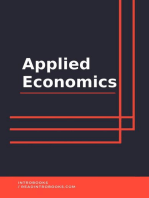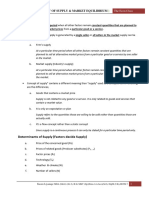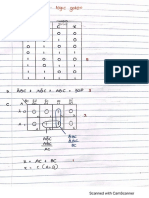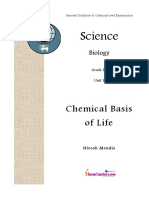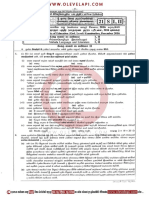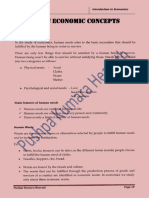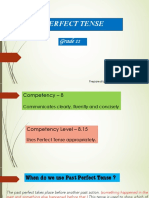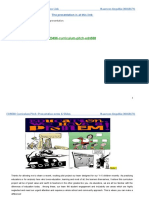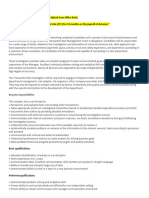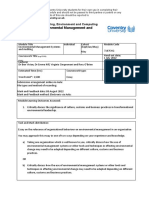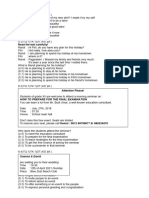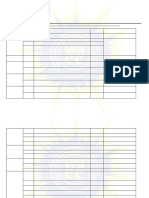1.1 Introduction To Economics
1.1 Introduction To Economics
Uploaded by
Manupa PereraCopyright:
Available Formats
1.1 Introduction To Economics
1.1 Introduction To Economics
Uploaded by
Manupa PereraOriginal Description:
Original Title
Copyright
Available Formats
Share this document
Did you find this document useful?
Is this content inappropriate?
Copyright:
Available Formats
1.1 Introduction To Economics
1.1 Introduction To Economics
Uploaded by
Manupa PereraCopyright:
Available Formats
1.
1
G.C.E. Advanced Level Examination 2024
ECONOMICS
INTRODUCTION To rath
ECONOMICS &
BASIC ECONOMIC CONCEPTS
P u s h p a
K u m a r a
H t
edu Heewny
Push
PUSHPA KUMARA HEARATH
B.Sc. Business Administration (Special) University of Sri Jayewardenepura
Introduction to Economics
INTRODUCTION T0 ECONOMICS
If someone asks from you how much of money is needed to buy all what you want at
this moment, you may say that a certain amount of money is needed to buy all of
them. But the issue is you don't have such an amount of money at the moment. Say at
a future point of time you earn this amount of money. But, by the time you earn that
amount of money, you will be thinking of consuming some other goods and services
which were not included to the previous list. For an example a person who has a
motorbike at the moment may be thinking of buying a car. But, by he time he
purchases a basic car, he will be thinking of buying a luxury car than what he bought. It
is the general nature that the human being is having an unlimited desireofconsuming
goods and services. But the resources available to satishy those wants are always
limited. So in economicsS we discuss about the logical behavior of human being in
satisfying their unlimited wants with a limited amount of resources
When the price of a certain good is increased, the consumersare discouraged to consume
that good. But at the same time producers are encouraged to produce more when the
price goes up. In economics we build up theories and models to learn and observe these
relationships exist among different economic variables So economics is not a subject with
some set of facts, but it isa subject which builds un theeries to observe the practice...
What is Economics...?
Economics is an old subject which has been evolving for about two centuries. It is also
treated as the queen of secial sciences. When observing the facts discussed within
economics and the methodology used in analyzing those facts, it could be identified as
a subject which covers wide seope. Most of the problems faced by modern societies
take an economical naturé Cost of living, rate of inflation, depreciation in the foreign
exchange rate, economic growth, poverty etc are fallen under the scope of economics.
Economics basically eoneerns about the human behavior towards the fulfillment of
their needsand wants for a better life. It is not a vision or a view, but a methodology
which provides guidelines to arrive at the accurate conclusions.
Economics is not a permanent truth. But it could be used to search for a permanent
truth.
For a better understanding about the nature of the subject and the scope of economics,
we will refer to some of the definitions given by world famous economists.
"The study of man in the ordinary business of life";
Alfred Marshall
Pushpa Kumara Hearath Page 2
Introduction to Economics
"The science which studies human behaviour in the relation between scarce resources
having alternative uses and the human wants."
Lionel Robbins
Based on the above definitions, the scope of economics and the methodology used in
economics, the subject 'economics' could be defined as follows.
Economics is the social science which studies the behaviour of the human
being in the fields of production, distribution, and consumption ofgoods
and seroices when they attempt to fulfill their unlimited oants with a
limited amount of resources.
a r
Whether Economics is a Science or an
Art..
An art is a formal set of facts which does not follow thescientificmethod.
A science is a subject which collects the data relevant to the respective field, analyze
them and arrive into logical conclusions using the seientific method. Here the scientific
method refers to the ability of accepting orejeeting by comparing the actual results
with the hypothesis made.
m o
Why economics is treated as a seience..
Any subject which follows the seientificmethod in its analysis is identified as a science.
In economics, the actual facts are compared with the hypothesis made and come into
logical condusions by following the scientific method. Therefore economics is
identified as a science
Sciences are divided into two categories as social sciences and natural sciences.
Economics is treated as a social science..
The sciences which are logically analyzing the behavior of people in the society are
identified as social sciences. Economics, political science, psychology can be identified
as examples for social sciences.
In economics, the behavior of people living in a socio economy is studied from the
economics point of view. Therefore economics is identified as a social science.
Pushpa Kumara Hearath Page 3
Introduction to Economics
The difference between economics and the natural sciences
In natural sciences, the experiments could be carried out in a factor controlled
environment. But in economics the experiments cannot be carried out in a factor
controlled environment. Due to the inability to carry out experiments in a factor
controlled environment, assumptions are made in economic theories to simplify the
complicated practice.
The difference between economics and other social sciences
In different social sciences, the behavior of human being in differentfields isdiseussed.
But in economics, the physical behavior of the human being is discussed That is the
behavior of human being in fulfilling his physical needs andwants isdiscussed in
economics. Through this, economics is differentiated from other socal sciences.
Importance of Learning Economics
Importance of learning economics can be listedas follows,
*Creates as ability to understand the econonmic behavior of a society
Important to become a successful citizen
Important when ruling a coùntry
Important in efficient decision making as consumers, producers and investors
Important when making political decisions such as voting for a certain political
party
Important in diecisionsregarding higher education and professions
Pusnp
PUb
Pushpa Kumara Hearath Page 4
Introduction to Economics
Major facts to be studied in Economics
There are five major facts that should be studied in economics.
01. Economic Reasoning
Economics train people to think in various ways. Economists take decisions
after analyzing everything in detail and comparing all the costs and the
benefits.
Economic decisions are taken in a way the benefits are exceeding the costs.
There isa technical methodology for economic reasoning.
02. Economic Terminology
There is a certain set of terms inherent for economics tob as tor the other
subjects (glossary of terms). It is vital to understand these terms in
relation to economics in order to understand the subject
Eg: Inflation, G.D.P, Opportunity cost, utility
03. Economic Theory
Economic theory is useful in understanding the óperations of an economic
system.
A n economic theory is a summarized description based on assumptions.
If the assumptions are not kndwn, theory will also be clear. And the
theories are used to explain the dbserved events.
Whether to accept or o reject a theory is depending not only upon the
accuracy of the theory but also upon the ability to accurately predict
based on that theoryThat is a successful theory assists in forecasting the
events whchare not yet observed.
Folowing methodology is used in a theory
Defining the problems
Assuming
P U S
Presenting hypothesis
Forecasting
Researching with the actual information and the forecasts
04. Economic Institutions
The places which are influencing us in our day today life and which are located
surrounding us could be identified as economic institutions.
In order to understand the application of economic theory, it is compulsory to
know about these economic institutions.
Economic institutions comprise of the collection of historical incidents, cultural
characteristics, political influences, social behavior, and regulatory system.
Pushpa Kumara Hearath Page 5
Introduction to Economics
05. Economic Policies
Economic policies refer to the actions taken by the government which influence
on the economic units. In other words these are the tools used by a government
to operate the economic system.
Eg when the unemployment is a major problem of an economy, government
should device policies to minimize unemployment.
It is important to understand properly the theory and the institution structure to
device economic policies.
Theoretical Components
There are few components in the scientific theories.
earatr
Variables
An event which may change and where such change could be qtántitatively measured
is identified as a variable. Basic elements of any theory are its variables. There is a set
of definitions which explain the variables in a theory
Assumptions
The summarized statements which explain the conditions under which a theory
should be applied are identified as assumptions. Assumptions are made to easily
understand a theory.
Hypothesis
This is a statement which shows the relationship among the variables. Through a
theory, hypothesis is testéd. If the hypothesis is proven through the theory, then that
theory would bearealistic theory.
Forecasts/Ptedictions
Theforeeasts ofá certain theory are the conclusions that can be made through that
theory A scientific forecast is expressed with some conditions. Therefore a scientific
forecastis diferent from a prediction.
Tests
Any theory is tested through the comparison of forecasts with the actual incidents. It
should be observed whether the forecasts made based on the theory are actually
happened or not.
Pushpa Kumara Hearath Page 6
Introduction to Economics
Constructing a theory/Model in economics
Properly identifieng the problem
Selecting the neccessary variablesdescribe the
to
problem and making assumptions
Constructing Hypothesis
Forecasting Based on the Hypothesis
Observing the Actual Results
Arriving into conclusions whether to accept or reject
based on the comparison between hypothesis and the
actual results
Pushpa Kumara Hearath Page 7
Introduction to Economics
Positive Economics & Normative Economics
Positive Economics
Positive economics is the study of a certain situation,
Which is currently prevailing (What is happening?)
Which prevailed in the past (What has happened?)
Which will prevail in the future (What will happen?)
Positive economic statements are highly objective (theoretical) and do not depend
upon the personal judgments. These can be scientifically proven. There a r e no
arguments regarding the positive economic statements among the economistsand they
are commonly accepted. The positive statements may be true or false
Hea
Normative Economics
Normative economics is the study of a certain situation which should prevail or what
should happen. These statements are highly based on personal judgments (subjective).
The normative statements may be decided upon religion, culture and rituals of the
person who make them. These statementscannot be scientifically proved.
01. Identify the positivestatementoutof the following statements
I. Increasing the priceleyel is a severe economic problem in a society
II. The economic growth rate should be maintained at least at 10%.
IL The gqvernnent should minimize the budget deficit
IV. Therate ofinflation in Sri Lanka in 2018 was 2.1
02. Identily the pormative statement out of the following statements
Theterms of trade of Sri Lanka has depreciated by 10%
Economic growth rate of 2020 was 2.5%
L The resource allocation of a centrally planned economy is done by the
government
IV. Obtaining foreign loans to finance the budget deficit would not be
appropriate
Pushpa Kumara Hearath Page 8
Introduction to Economics
03. State whether the following statements are positive or normative
01. The per capita GDP of Sri Lanka was 4085 USDs in 2020
POshpaKUmaraNedld
02. The consolidated broad money supply has been increased by 6.71 in
year 2020
**********************************************************************************************
03. The domestic savings ratio could have been at least maintained at 20%
in 2020
****************************************************************************** ******
04. The Sri Lankan government should not obtain loans from International
Monetary Fund
* * * **
** ** ******* *
****** ********.
e a r
Micro Economics & Macro Economics
Micro Economics
*****"****************************************
****************************************************
*********************************************
*** *****************************
*********************************************** * ***************************************************
**************************** . *****************************************************
s h
...
p
*************************************
K
a u
************************************************************.
***********
***********************************************************************.
Macro Economics
***** ***** ************* ***** ******************************************* *********************"********
**************************************************** **********************
* *******************************************************************************************************
*********************************************************************** **********************************
********************* *********.********************* ******* * ***************
************************************************************************************************************
**********************************************************************************************************
Pushpa Kumara Hearath Page 9
You might also like
- Grade 12 Economics 1st Term Test Paper With Answers 2019 North Western ProvinceDocument17 pagesGrade 12 Economics 1st Term Test Paper With Answers 2019 North Western ProvinceManupa Perera94% (17)
- Introduction To Advanced Level Economics: by Brian RopiDocument293 pagesIntroduction To Advanced Level Economics: by Brian RopiSimba Nhepera100% (1)
- Economic Analysis For Business, Managerial Economics, MBA EconomicsDocument215 pagesEconomic Analysis For Business, Managerial Economics, MBA EconomicsSaravananSrvn90% (10)
- Social Preferences: An Introduction to Behavioural Economics and Experimental ResearchFrom EverandSocial Preferences: An Introduction to Behavioural Economics and Experimental ResearchNo ratings yet
- Scope and Methods of Economics: I Learning ObjectivesDocument5 pagesScope and Methods of Economics: I Learning ObjectivesMics leonNo ratings yet
- Introduction To EMEDocument11 pagesIntroduction To EMEankitupadhyay2241No ratings yet
- ECN 202: Introductory Macroeconomics: Module 1: Introduction To MacroeconomicsDocument18 pagesECN 202: Introductory Macroeconomics: Module 1: Introduction To MacroeconomicsBielan Fabian GrayNo ratings yet
- MEPA-given To Students1Document162 pagesMEPA-given To Students1Lakshminarayana Reddy KosuriNo ratings yet
- Managerialeconomics - NotesDocument33 pagesManagerialeconomics - NotesSilent GirlNo ratings yet
- Vu Me Unit IDocument17 pagesVu Me Unit IsurakshaNo ratings yet
- AP Economics Level 3 - WK1Document38 pagesAP Economics Level 3 - WK1saudminecraftgamer0035No ratings yet
- Questionanswers MEDocument33 pagesQuestionanswers MEprabhuNo ratings yet
- MEFA MaterialDocument188 pagesMEFA MaterialnaveenNo ratings yet
- Managerial Econ Module 1 Basic Concepts of EconDocument6 pagesManagerial Econ Module 1 Basic Concepts of EconStephanieNo ratings yet
- Unit 1 bom business economics sem 1Document15 pagesUnit 1 bom business economics sem 1Lg PrabanjanNo ratings yet
- Material - Financial AccountingDocument211 pagesMaterial - Financial AccountingRock StarNo ratings yet
- Introduction To Economics Edited 2022Document283 pagesIntroduction To Economics Edited 2022feleke philiphosNo ratings yet
- Introduction and Principles of Microeconomics (Autosaved)Document22 pagesIntroduction and Principles of Microeconomics (Autosaved)Peter MutakilaNo ratings yet
- Managerial Economics Final 2 Hons I Year PDFDocument23 pagesManagerial Economics Final 2 Hons I Year PDFSANYAM PATILNo ratings yet
- Eco Chap 1Document27 pagesEco Chap 1Darsani SelvarajNo ratings yet
- Micro - Scope and NatureDocument4 pagesMicro - Scope and Naturekhushidetwal3No ratings yet
- Module 1: Basic Concepts and Principles: Nature of EconomicsDocument10 pagesModule 1: Basic Concepts and Principles: Nature of EconomicsSofia Lynn Rico RebancosNo ratings yet
- Unit-I: Introduction To Managerial EconomicsDocument42 pagesUnit-I: Introduction To Managerial EconomicsSai Srinivas BodapatiNo ratings yet
- Economics IDocument56 pagesEconomics ITopXGaming OpNo ratings yet
- Mefa Final Notes PDFDocument188 pagesMefa Final Notes PDFRîshï VîjâÿNo ratings yet
- Mefa Unit-1Document19 pagesMefa Unit-1Anusha ReddyNo ratings yet
- Unit I - IvDocument97 pagesUnit I - IvSparsh JainNo ratings yet
- HMB 5 Applied Economics Chapter 1Document19 pagesHMB 5 Applied Economics Chapter 1Aldrin Jr Barras ArcillaNo ratings yet
- Managerial Economics and Financial Analysis: Unit-IDocument24 pagesManagerial Economics and Financial Analysis: Unit-IDhanamistrendyNo ratings yet
- Economics and Financial Accounting NotesDocument187 pagesEconomics and Financial Accounting NotesGovindinne SivakanthareddyNo ratings yet
- Me Final Digital NotesDocument77 pagesMe Final Digital Notesvinay.20dbbNo ratings yet
- Paper 1.1 - Economics For ManagersDocument25 pagesPaper 1.1 - Economics For ManagersManoj G NNo ratings yet
- Introduction To EconomicsDocument17 pagesIntroduction To EconomicsNicole ViernesNo ratings yet
- Syllabus Class: - BBA I Year Subject: - Micro EconomicsDocument64 pagesSyllabus Class: - BBA I Year Subject: - Micro EconomicsHasan HamidNo ratings yet
- ME Unit-1, Lec-1,2Document22 pagesME Unit-1, Lec-1,2AakashNo ratings yet
- MEFA MaterialDocument178 pagesMEFA Materialharish raoNo ratings yet
- Economics Chapter 1-3Document44 pagesEconomics Chapter 1-3TesfayeNo ratings yet
- Befa Unit 1Document17 pagesBefa Unit 1ManikantaNo ratings yet
- Nature and Scope of EconomicsDocument3 pagesNature and Scope of EconomicsyashNo ratings yet
- Economics PresentationDocument26 pagesEconomics PresentationTan MoyNo ratings yet
- Basic Microeconomics MODULE 1Document10 pagesBasic Microeconomics MODULE 1Isabelle MariaNo ratings yet
- The Economic MethodDocument8 pagesThe Economic MethodMark VrankenNo ratings yet
- BEFA UNIT - 1 MaterialDocument21 pagesBEFA UNIT - 1 Materialsaitejagedekar8No ratings yet
- Chapter One Basics of EconomicsDocument19 pagesChapter One Basics of Economicsheaven letaNo ratings yet
- Study MaterialsDocument14 pagesStudy MaterialsAnkur DuttaNo ratings yet
- MEFA 1 To 6 Units MaterialDocument161 pagesMEFA 1 To 6 Units MaterialbhanuandchandhuNo ratings yet
- ECON 102 (C1)Document8 pagesECON 102 (C1)Bambii MirriNo ratings yet
- Unit - 1 KMBN-102 Managerial EconomicsDocument22 pagesUnit - 1 KMBN-102 Managerial EconomicsAnshitaNo ratings yet
- Mefa PDFDocument208 pagesMefa PDFgjNo ratings yet
- Economics Group Assignment 1Document25 pagesEconomics Group Assignment 1Hailu BadyeNo ratings yet
- Economics: While Discussing The Nature of Economics, One Has To Consider (1) The Subject MatterDocument23 pagesEconomics: While Discussing The Nature of Economics, One Has To Consider (1) The Subject MatterKIRUTHIKANo ratings yet
- EEM-Study-Material 24102017 065649AMDocument134 pagesEEM-Study-Material 24102017 065649AMShrey ContractorNo ratings yet
- Module 1 EconomicsDocument5 pagesModule 1 EconomicsAbdul Rahman B. AraNo ratings yet
- Applied Economics: Module No. 1: Week 1: First QuarterDocument7 pagesApplied Economics: Module No. 1: Week 1: First QuarterhiNo ratings yet
- Economics Is A Science As Well As An Art ExplainDocument4 pagesEconomics Is A Science As Well As An Art ExplainExport ImbdNo ratings yet
- MANAGERIAL ECONOMICS Notes Unit I & II PDFDocument41 pagesMANAGERIAL ECONOMICS Notes Unit I & II PDFrudypatil67% (6)
- Rethinking Money and Capital: New Economics for Qe, Stimulus, Negative Interest, and CryptocurrenciesFrom EverandRethinking Money and Capital: New Economics for Qe, Stimulus, Negative Interest, and CryptocurrenciesNo ratings yet
- A simple approach to behavioural finance: The introductory guide to the theoretical and operational principles of behavioural finance to improve investment resultsFrom EverandA simple approach to behavioural finance: The introductory guide to the theoretical and operational principles of behavioural finance to improve investment resultsNo ratings yet
- Supply & Market Equilibrium TuteDocument44 pagesSupply & Market Equilibrium TuteManupa PereraNo ratings yet
- 23.03.2023 NoteDocument6 pages23.03.2023 NoteManupa PereraNo ratings yet
- Em Econ t1 g12 I, II PP Ans 2019Document16 pagesEm Econ t1 g12 I, II PP Ans 2019Manupa PereraNo ratings yet
- 30.03.2023 NoteDocument5 pages30.03.2023 NoteManupa PereraNo ratings yet
- Grade 12 Information and Communication Technology 2nd Term Test Paper With Answers 2020 North Western ProvinceDocument20 pagesGrade 12 Information and Communication Technology 2nd Term Test Paper With Answers 2020 North Western ProvinceManupa PereraNo ratings yet
- 10.1 Chemical Basis of Life - 05th JanDocument15 pages10.1 Chemical Basis of Life - 05th JanManupa Perera100% (1)
- 2016 Ol Sinhala Part II Paper Olevelapi PDFDocument5 pages2016 Ol Sinhala Part II Paper Olevelapi PDFManupa PereraNo ratings yet
- 2018 Ol Buddhism Part II Paper Sinhala Medium Olevelapi PDFDocument2 pages2018 Ol Buddhism Part II Paper Sinhala Medium Olevelapi PDFManupa Perera100% (1)
- French Language: Grade 11Document37 pagesFrench Language: Grade 11Manupa PereraNo ratings yet
- Economics: Questions FromDocument5 pagesEconomics: Questions FromManupa PereraNo ratings yet
- Internet and EmailDocument30 pagesInternet and EmailManupa PereraNo ratings yet
- Literature in EnglishDocument7 pagesLiterature in EnglishManupa PereraNo ratings yet
- 1.1. Basic Economic ConsentsDocument9 pages1.1. Basic Economic ConsentsManupa PereraNo ratings yet
- Past Perfect TenseDocument13 pagesPast Perfect TenseManupa PereraNo ratings yet
- 2010 OL Sinhala Language and Literature Past PaperDocument8 pages2010 OL Sinhala Language and Literature Past PaperManupa PereraNo ratings yet
- ST Reg Number For 2022Document4 pagesST Reg Number For 2022Manupa PereraNo ratings yet
- French All Tenses: by Manupa PereraDocument2 pagesFrench All Tenses: by Manupa PereraManupa PereraNo ratings yet
- French 11 Feb 08 FinalDocument10 pagesFrench 11 Feb 08 FinalManupa PereraNo ratings yet
- Ananda College - Colombo 10: - 2019 JuilletDocument8 pagesAnanda College - Colombo 10: - 2019 JuilletManupa PereraNo ratings yet
- Pw2 Signal FinalDocument7 pagesPw2 Signal FinalSharifah SyazwaniNo ratings yet
- TOS Math-7 2nd-Quarter-Test 2023-2024 FINALDocument6 pagesTOS Math-7 2nd-Quarter-Test 2023-2024 FINALMara Ciela CajalneNo ratings yet
- 7A 650V N-Channel Enhancement Mode Power MOSFET: 7N65/F7N65/I7N65/E7N65/B7N65/D7N65Document11 pages7A 650V N-Channel Enhancement Mode Power MOSFET: 7N65/F7N65/I7N65/E7N65/B7N65/D7N65Sergio Daniel CaminoNo ratings yet
- EDN588 CurriculumPitch-3Document9 pagesEDN588 CurriculumPitch-3Naazreen AngulliaNo ratings yet
- Know Like TrustDocument3 pagesKnow Like TrustVishalNo ratings yet
- Sepo L2 JDDocument2 pagesSepo L2 JDPrajwa XbhNo ratings yet
- V S Filter Leaflet English Double Page VersionDocument2 pagesV S Filter Leaflet English Double Page VersionCrisnuel RamirezNo ratings yet
- PFD FileDocument192 pagesPFD FileThilina RathnayakeNo ratings yet
- Assignment Brief 7167EXQ CW1Document6 pagesAssignment Brief 7167EXQ CW1saba saidNo ratings yet
- Mathematical Induction in Different Contexts HvitfeldtskaDocument13 pagesMathematical Induction in Different Contexts HvitfeldtskaTamirat GebremariamNo ratings yet
- Ollow at Facebook/Telegram: Je MantraDocument7 pagesOllow at Facebook/Telegram: Je MantrabirukNo ratings yet
- Working Document Layout StrategiesDocument8 pagesWorking Document Layout StrategiesBunnyNo ratings yet
- Comparative Studies of LWD and BBD in LVRDocument10 pagesComparative Studies of LWD and BBD in LVRVinod KumarNo ratings yet
- Forces TIPERS 2 (1)Document8 pagesForces TIPERS 2 (1)lejiazhang.usNo ratings yet
- Analysis of Cuckoo Search Efficiency: Carlos Eduardo M. Barbosa Germano C. VasconcelosDocument8 pagesAnalysis of Cuckoo Search Efficiency: Carlos Eduardo M. Barbosa Germano C. VasconcelosDavid StuartNo ratings yet
- Practice Final Exam: AX UTDocument14 pagesPractice Final Exam: AX UTNeda'a HamedNo ratings yet
- Various Methods of Length Measurements: Parallax MethodDocument12 pagesVarious Methods of Length Measurements: Parallax MethodMasihur SkNo ratings yet
- ASTM D 2290Document5 pagesASTM D 2290Pablo AlcázarNo ratings yet
- Plate Load Test ReportDocument15 pagesPlate Load Test Reportmithun100% (1)
- Worksheet 7Document3 pagesWorksheet 7storage01871No ratings yet
- Freon 404a Thermodynamic Properties EngDocument32 pagesFreon 404a Thermodynamic Properties Engforeruner343No ratings yet
- Template Soal - Binggris - Anis JSDocument15 pagesTemplate Soal - Binggris - Anis JSTri WahyuniNo ratings yet
- Lecture 4 Biological DatabasesDocument29 pagesLecture 4 Biological DatabasesVeer khadeNo ratings yet
- Majed Abdullah Site EngineerDocument4 pagesMajed Abdullah Site Engineerbdf002561No ratings yet
- Physics 111: OscillationsDocument13 pagesPhysics 111: OscillationsOmar ChavezNo ratings yet
- DocDocument2 pagesDocJanice B.PolbosNo ratings yet
- Khalat Jamal Taher AlamaDocument2 pagesKhalat Jamal Taher AlamaKhalat JamalNo ratings yet
- Design of Ball BearingDocument95 pagesDesign of Ball BearingVELMURUGAN MNo ratings yet
- Learning Episode 1-ReflectionDocument1 pageLearning Episode 1-ReflectionZackyung ContilloNo ratings yet
- WASSCE-PC1-2025-PROV.-TT-UPDATED-OCT-8-2024-003Document5 pagesWASSCE-PC1-2025-PROV.-TT-UPDATED-OCT-8-2024-003Dr Nicholas PatricksNo ratings yet
